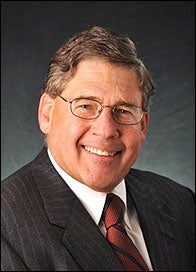GUEST COLUMN: Understanding political, philosophical and intellectual diversity
Our greatest responsibility as a university is to provide our students a rich, ethical and diverse educational environment that promotes critical thinking and protects the free exchange of ideas.
In this light, the Board of Regents has drafted a mission statement and attendant "Guiding Principles" of the University of Colorado.
Among the latter is the following draft principle, now being considered by the components of our shared governance, including our faculty:
"Promote faculty, student and staff diversity to ensure the rich interchange of ideas in the pursuit of truth and learning, specifically including faculty diversity of political, intellectual and philosophical perspectives."
This guidance is meant for all members of our complex university family, but places with our esteemed faculty the prime responsibility of fostering political, philosophical and intellectual diversity.
Although few academics argue against such a concept, some have expressed specific concerns, which I seek to address below:
- Concern: "Our faculty promote intellectual and philosophical diversity, but political diversity is an inappropriate goal. Are we going to ask potential faculty candidates whether they are Democrat or Republican?"
Response: No, we are not proposing that political party affiliation ever become a litmus test for hiring at CU. Rather, where important to the educational milieu of a given academic discipline, the university should specifically recruit a professor who will meet the intellectual diversity needs of the university in addition to recruiting a candidate who is highly qualified for the position. For example, when the School of Law has a position available, it might choose to search specifically for a scholar who has demonstrated interest and expertise in U.S. constitutional law, who is a proponent of the classical interpretation of that document and who is also a recognized proponent of Jeffersonian principles.
Unquestionably there should be full intellectual, philosophical and political diversity of the humanities if we are to create fertile, keen and frequent debate and exchange of thoughts and ideologies. Such activity will surely benefit our students. After all, our mission is not to indoctrinate our young people, but to provide them the finest possible educational foundation and broad exposure to all reasonable views. Such an education will best allow our students to determine their own viewpoint.
- Concern: "There are a number of guidelines in place that discourage inappropriate discussion of an ideological or political nature in the classroom." (Professors must not depart from the subject matter of the course to inject their own political or ideological agenda.) "I pride myself, as do my colleagues, in concentrating on the subject matter of the course and I make every effort to present information objectively without undue bias. I also attempt to lay out all sides of significant issues."
Response: Yes, we do have a number of Regent Laws and Policies in place. However, to create the optimal educational environment, we must advance beyond mere prevention of bias in the classroom, and encourage a faculty with differing viewpoints, values, philosophies and ideologies who may express those beliefs in appropriate settings (i.e. department or campus debates, opinion pieces, etc.)
- Concern: "There are many academic activities for which intellectual, political and philosophical diversity are irrelevant – such as the teaching of the basic sciences and the professional school curricula on the Anschutz Medical Campus."
Response: True, it is not relevant to encourage political diversity for many of our academic disciplines. However, most every subject will present major and commonly accepted competing philosophies or theories which should be explored, regardless of the professor's personal perspectives. However, we should strive to include proponents of the various (reasonable and commonly accepted) divergences when important controversy occurs. Such diverse representation would stimulate abounding debate and interchange. It would also serve to restrain any individual engaged in intellectually irresponsible behavior, such as dishonest or unethical violations of the scientific method by distortion of observation or data gathering, or misrepresentation of conclusions.
- Concern: "Any such guidance given by the Board of Regents is an infringement upon the academic freedom and the authority of the faculty."
Response: The regents have a constitutional obligation to the people of Colorado to set the general framework inside which the university operates. The responsible, ethical and appropriate conduct of the university, and the delivery of high quality services to our students are included within the responsibilities of your elected Board of Regents. Further, why would any faculty member have concern about promoting diversity of political, intellectual, and philosophical perspectives? Isn't that what we stand for?
The concerns above have been expressed to me and some of my colleagues on the Board of Regents. There may be other concerns. We welcome discussion on the issue, particularly perspective from the faculty. We have had some exchange already, but would encourage more as the board prepares to take up this issue once again at our June meeting.
We have the opportunity to be the first large public university to openly champion the principles of political, intellectual and philosophical diversity!
Dr. Jim Geddes of Sedalia is a practicing surgeon who represents Colorado's Sixth Congressional District on the CU Board of Regents. While the views above are shared by a number of the members of the board, they do not wholly represent the views of the entire board.


